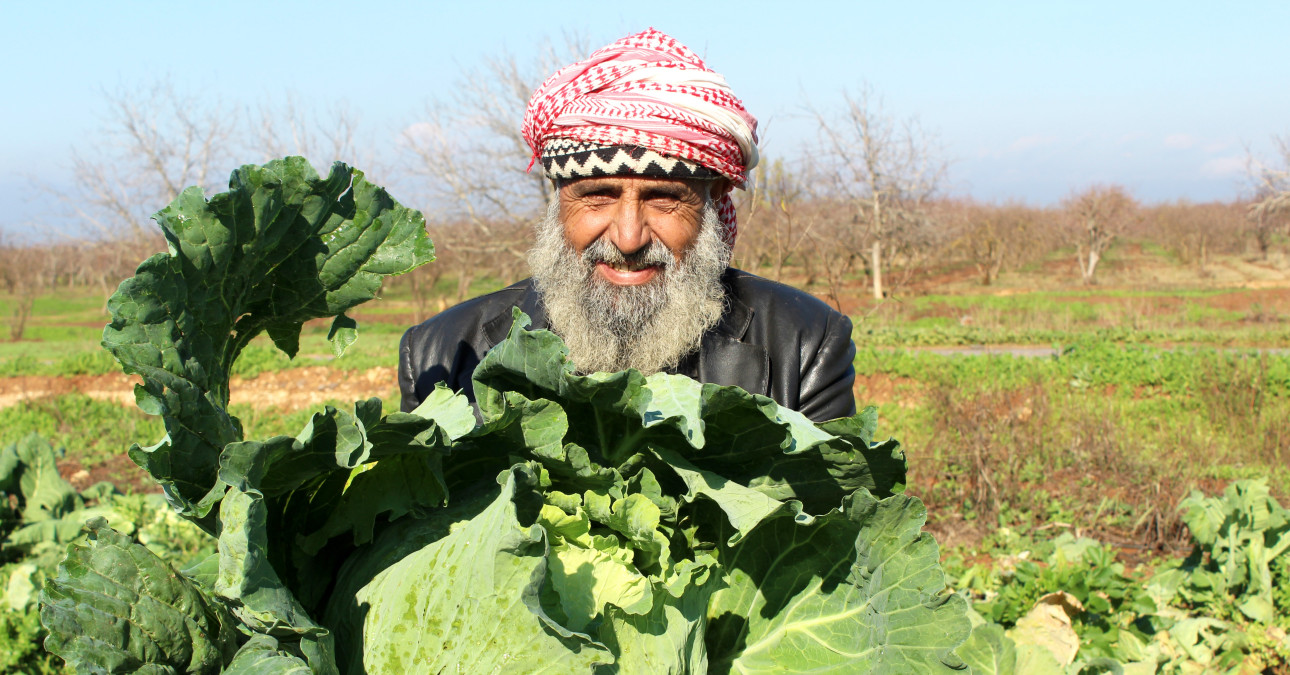Syrian farmers triumphing against the odds
Published: Sep 11, 2019 Reading time: 4 minutes Share: Share an articleAbdul-Rahman, now a grandfather, still misses his three sons keenly. “They used to work with us on the land and help support the family,” he says, as he walks us through his cabbage crop.
Children often grow up and leave the family farm, much to their parents’ sadness. But in Abdul-Rahman’s case, the loss is far greater: his sons were all killed in airstrikes during the conflict that has raged for eight years across Syria.

It is a war that has left no part of the economy untouched. Hundreds of factories and other employers have been forced to close, basic costs have risen, and food production has plummeted. The UN Food and Agricultural Organization estimates that the agricultural sector has suffered losses of more than $16 billion since the start of the conflict. Farmers have been forced from their lands by the fighting, and others have fled the country entirely. Many of those who stayed have given up farming because of the rising costs of seeds, fertilizers, and fuel.
Not only does this mean the loss of thousands of jobs—before the war, the sector was a source of livelihood for half of the population, and Syria was a regional exporter of wheat, sheep and vegetables—it has also driven up food prices for families already struggling to get enough to eat.
Despite these challenges, and their own personal losses, small farmers like Abdul-Rahman have soldiered on. But it has become harder and harder for them to continue. “Seeds, fertilizers and the cost of ploughing the land has increased sharply,” he told us, “while vegetable prices have not.”
Giving hope to thousands of farmers
With so many skilled farmers already lost, it is critical that farmers like Abdul-Rahman are helped to go on working the land and producing food.
So last year, People in Need helped 5,000 farmers to do just that, thanks to UK aid from the UK government and the German Federal Foreign Office through our Alliance2015 partner Welthungerhilfe. Each farmer was given vouchers for use in local shops, to allow them to buy much-needed seeds, fertilizers and tools.
“I bought cabbage, lettuce and parsley seeds,” Abdul-Rahman said, proudly showing us the results.
Monir, a farmer in another village not far from Abdul-Rahman’s, owns a plot of olive trees and rents additional fields to make ends meet. It’s hard work, and the escalating costs make it harder.
“I rent land which is not very expensive but does not yield good products,” Monir told us. This year, he has taken on an additional ten acres of un-irrigated land, which will take weeks of work to prepare for planting vegetables. But our vouchers have allowed him to buy fertilizer, to help make his rented fields more productive, and herbicides to control disease.
Another farmer, Mohamed, was a tiler and floor layer before the war, but turned to the land when the local economy collapsed. In the past, he often had to go into debt in order to buy seeds or fertilizers.
But with our vouchers, he told us, “I can buy peas and cucumber seeds to plant almost three [acres].” He was also given specialised training on how to understand soil and fertilisation, in order to help maximise his yield.
Improving farming processes is good not only for farmers themselves, but for all families in the area. “By working in the land we take care of our needs,” Mohamed told us, “and when we have more than our needs, we sell it in the village shops.”
In a country where millions of people are in need of food aid, the contributions of farmers like Mohamad are of no small importance. It is difficult to plant and plan ahead when the country is in a state of crisis, and matters have only grown worse in the last two months. Vast amounts of wheat, barley, olive and pistachio crops have been burned by recent airstrikes and fighting—over 5,000 hectares, according to a report by the NGO Shafak.
“We are exhausted by the situation,” Mohamad confessed to us, “and we hope this will come to an end.”
The future for these farmers, like for so many in Syria, is desperately uncertain. But they are continuing to plant their lands with wheat, and barley, and summer vegetables. That is, in itself, a declaration of hope.
Since 2014, People in Need has been supporting thousands of conflict-affected households in northern Syria to provide for their families in very difficult circumstances, thanks to UK aid from the UK government, the German Federal Foreign Office and others.
Learn more about our work in Syria here.






